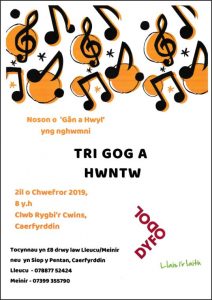Dyfodol i’r Iaith has reacted angrily to a clause within the Government’s new curriculum White Paper. This clause states that all funded education, including playgroups, must teach English as a compulsory element of the curriculum. This runs contrary to the current provision, which allows English to be introduced gradually from the age of 7.
“This clause aims an arrow at the very heart of Welsh-medium education,” said Heini Gruffudd, Dyfodol’s Chair. “This foundation phase is critical to learning. We must insist that the Welsh language be given a special space during this phase if we are to see our children learn and become fluent in the language. I cannot think of any precedence for such a proposal; indeed, the White Paper itself states that English is not a subject that requires such statutory status.”
“Yet another folly of course is that that the Government is undoing the attempts to support the Welsh language and undermining its own aim to create a million Welsh speakers. We cannot accept such a ridiculous proposal. This is an incomparable retrograde move, and one which undermines some of the most fundamental principles of Welsh-medium education.”

